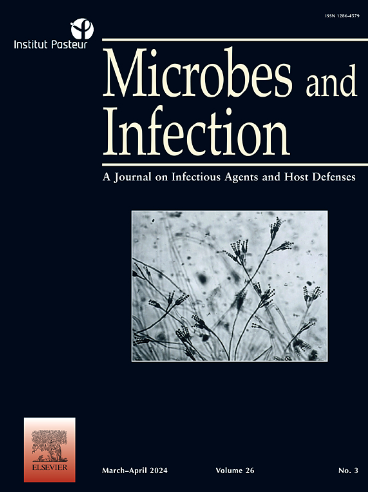"腺病毒感染导致的 HERV 再激活与病毒免疫调节有关"。
IF 2.7
4区 医学
Q3 IMMUNOLOGY
引用次数: 0
摘要
人内源性逆转录病毒(herv)通常因甲基化或突变而沉默,可被多种环境因素重新激活,包括外源性病毒感染。在这项工作中,我们研究了人腺病毒C血清5型(HAdV-C5)感染人肝细胞(HepaRG)后herv的转录活性。HAdV-C5感染导致几个HERV组以及差异表达基因的再激活。有趣的是,在HAdV-C5感染中,染色体上与上调的HERV基因位点接近的上调基因与影响病毒癌变和炎症信号传导有关。我们还发现了一个FBXO17转录物,编码HAdV-C5感染时的内含子ERVK9-11序列。FBXO17先前被描述为干扰素应答调节的一个重要因素。这表明,特定的HERV群可能具有触发基因网络和影响病毒免疫反应的潜力。本文章由计算机程序翻译,如有差异,请以英文原文为准。
HERV reactivation by adenovirus infection is associated with viral immune regulation
Human endogenous retroviruses (HERVs), which are normally silenced by methylation or mutation, can be reactivated by a variety of environmental factors, including infection with exogenous viruses. In this work, we investigated the transcriptional activity of HERVs following infection of human liver cells (HepaRG) with human adenovirus C serotype 5 (HAdV-C5). HAdV-C5 infection results in reactivation of several HERV groups as well as differentially expressed genes. Interestingly, in HAdV-C5 infection, upregulated genes that were in close chromosomal proximity to upregulated HERV loci were associated with influencing viral carcinogenesis and inflammatory signaling. We also identified an FBXO17 transcript encoding an intronic ERVK9-11 sense sequence upon HAdV-C5 infection. FBXO17 has previously been described as an important factor in the regulation of the interferon response. This suggests that specific HERV groups may have the potential to trigger gene networks and influence viral immune responses.
求助全文
通过发布文献求助,成功后即可免费获取论文全文。
去求助
来源期刊

Microbes and Infection
医学-病毒学
CiteScore
12.60
自引率
1.70%
发文量
90
审稿时长
40 days
期刊介绍:
Microbes and Infection publishes 10 peer-reviewed issues per year in all fields of infection and immunity, covering the different levels of host-microbe interactions, and in particular:
the molecular biology and cell biology of the crosstalk between hosts (human and model organisms) and microbes (viruses, bacteria, parasites and fungi), including molecular virulence and evasion mechanisms.
the immune response to infection, including pathogenesis and host susceptibility.
emerging human infectious diseases.
systems immunology.
molecular epidemiology/genetics of host pathogen interactions.
microbiota and host "interactions".
vaccine development, including novel strategies and adjuvants.
Clinical studies, accounts of clinical trials and biomarker studies in infectious diseases are within the scope of the journal.
Microbes and Infection publishes articles on human pathogens or pathogens of model systems. However, articles on other microbes can be published if they contribute to our understanding of basic mechanisms of host-pathogen interactions. Purely descriptive and preliminary studies are discouraged.
 求助内容:
求助内容: 应助结果提醒方式:
应助结果提醒方式:


